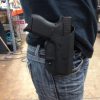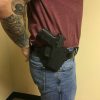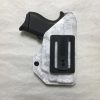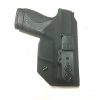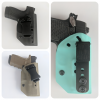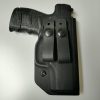The process for getting a concealed carry permit is slightly different in each state; however, there are some common terms and requirements. Sometimes different abbreviations are used for a concealed carry permit:
CCW – Concealed Carry of a Weapon
CCP – Concealed Carry Permit
CFP – Concealed Firearms Permit
CPL – Concealed Pistol License
CHL – Concealed Handgun License
CWP – Concealed Weapons Permit
Generally speaking, these refer to the same kind of permit. However, some states or local authorities issue a blanket permit for concealed carry of weapons in general (firearms, knives, electronic devices, clubs, etc…), rather than just a firearm.
A state or local permitting authority will require an applicant to prove citizenship and residency, fill out an application, and pay fees. Some jurisdictions will require proof that the applicant has attended and passed an approved firearm safety course. Once an applicant has met all the requirements the permitting authority may or may not issue the permit. A state will fall into one of three main categories for issuing permits:
Shall Issue
A state with a Shall Issue designation means that the state shall issue a concealed carry permit to any citizen that meets the defined eligibility criteria, as outlined by a state authority. These criteria may vary from state to state, but neither the state, nor any local authority, can legally deny a permit to anyone that meets the criteria and pays the required fees.
May Issue
A state with a May Issue designation means that the state may issue a concealed carry permit to any citizen that meets the defined eligibility criteria. These criteria will vary from state to state and the granting of a permit is left to the discretion of the permitting authority, which could be any level of local or state authority. Some states leave the final decision to local counties and those counties require permission from the county sheriff. The local authority may require an applicant to demonstrate a need, or “good cause” for the permit. Sometimes the granting of a permit is left to the whim of a single individual.
No Issue/Right Denied
This designation means that the state does not issue any concealed carry permit to any citizen. Currently, the only No Issue jurisdiction in the country is the District of Columbia. Some May Issue states, such as New Jersey, are effectively No Issue states due to the infrequency of granting permits.
Resident Vs. Non-Resident
Some states issue permits, whether shall or may issue, to residents and non-residents. Other states require that an applicant be a permanent state resident. For example, the State of Florida, which has many seasonal residents and vacationers, will issue a permit to a permanent resident of the state or to a non-resident.
Reciprocity
Reciprocity is a term that is commonly used when discussing concealed carry permits. Although many states have different requirements to issue a permit, some states allow holders of concealed carry permits from other states to legally carry. For example, the State of Florida has concealed carry permit reciprocity with 30 other states. Holders of a Florida concealed carry license can legally carry a concealed weapon in those other 30 states without having to go through the permitting process and paying fees to each of those states.
For additional information, please visit these sites:
http://www.nraila.org/gun-laws.aspx


